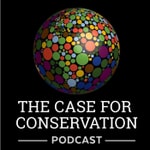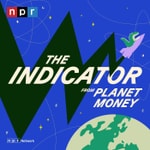The Case for Conservation Podcast – Details, episodes & analysis
Podcast details
Technical and general information from the podcast's RSS feed.

The Case for Conservation Podcast
www.case4conservation.com
Frequency: 1 episode/30d. Total Eps: 60

The case for conserving nature and its biodiversity needs to be robust and credible. Sometimes that requires a willingness to re-examine conventional wisdom.
Monthly episodes of The Case for Conservation Podcast feature introspective conversations with fascinating experts - from ecologists to economists, young professionals to Nobel laureates, journalists to media personalities.
Recent rankings
Latest chart positions across Apple Podcasts and Spotify rankings.
Apple Podcasts
🇨🇦 Canada - nature
02/08/2025#98🇨🇦 Canada - nature
01/08/2025#79🇨🇦 Canada - nature
31/07/2025#69🇨🇦 Canada - nature
30/07/2025#58🇨🇦 Canada - nature
29/07/2025#41🇬🇧 Great Britain - nature
15/07/2025#87🇬🇧 Great Britain - nature
14/07/2025#63🇬🇧 Great Britain - nature
13/07/2025#44🇬🇧 Great Britain - nature
25/05/2025#88🇬🇧 Great Britain - nature
24/05/2025#68
Spotify
No recent rankings available
Shared links between episodes and podcasts
Links found in episode descriptions and other podcasts that share them.
See all- https://www.case4conservation.com
61 shares
- https://ourworldindata.org/
58 shares
- https://colossal.com/
22 shares
RSS feed quality and score
Technical evaluation of the podcast's RSS feed quality and structure.
See allScore global : 47%
Publication history
Monthly episode publishing history over the past years.
48. What about free market environmentalism? (Ronald Bailey)
lundi 2 septembre 2024 • Duration 45:31
Protection of the environment is strongly associated with regulation of the human activities that threaten it, and regulation is usually administered by government. Although almost everyone would probably agree that some regulation is necessary, regulation has a patchy record when it comes to environmental protection. And there is another approach to achieving environmental goals. Free market environmentalism, instead of protecting nature from market forces, harnesses those forces to protect nature. Or at least that's the idea.
Ronald Bailey is the longtime science writer for Reason Magazine, a renowned American libertarian news & opinion outlet that’s been around for more than 50 years. Ron joins me to flesh out the case for free market environmentalism.
Links to resources
- Ronald Bailey - Ron's profile page on the Reason website
- The limits to growth - 1972 book about the possibility of exponential economic and population growth
- Population bomb - 1968 book by Paul Erlich that speculated about the dangers of overpopulation
- Silent Spring - 1962 book by Rachel Carson about the effects of pesticide on the environment and people
- Environmentalists Shocked That Local People Protect Forests Better Than Do Governments - 2014 article of Ron’s in Reason Magazone, including links to further information, about how indigenous peoples and local communities can be good stewards of the environemnt
- The Environmental Trinity — 2024 article by Jesse Ausubel about ecomodernism and decoupling from resource-use
- Our World in Data - A website that shows global trends in easy-to-grasp graphic format
47. Why is whaling still... a thing? (Joji Morishita)
lundi 5 août 2024 • Duration 59:35
There are few environmental issues more emotive than the hunting of whales. Although the focus of environmentalists has shifted to other topics in recent times, whaling remains contentious whenever it is brought up. This is understandable considering that, for the first half of the 20th century and into the 1970s, several whale species were hunted to near-extinction. But as crude oil took over from whale oil as the fuel of industry whale populations began making impressive recoveries. Nevertheless, a handful of countries and populations continue to hunt them, much to the chagrin of the rest of the world. Perhaps the most high profile whaling country is Japan. To add to the saga, in 2019 Japan ended about seven decades of membership of the International Whaling Commission (IWC) - the global body responsible for the “management of whaling and conservation of whales”.
There are countless sources providing the anti-whaling point of view, to some of which I will provide links in the podcast description. But comprehensive accounts of the other side of the story are less easy to find. Joji Morishita has been, among many other things, Japan’s Commissioner to the IWC (2013 - 2018) and IWC Chair (2016 - 2018) and I doubt there is any better person in the world to tell Japan’s side of the whaling story. In this fascinating discussion he explains why Japan withdrew from the IWC, and he takes on many of the core arguments against whaling.
Links to resources
- Japan whaling: Why commercial hunts have resumed despite outcry - 2019 BBC overview of the topic
- Japan's Withdrawal from International Whaling Regulation - Book co-authored by Joji in 2023
- Commercial Whaling - International Whaling Commission statements on the whaling moratorium and commercial whaling
- History of Whaling - A chronology of whaling going back to the 9th Century, on the website of the Japan Whaling Association
- Save the Whales - GreenPeace website on whaling
- Reflections on the Future of the International Whaling Commission - The first of a four-part series of articles by Joji
38. Should science and activism be kept separate? (Andrea Bandelli)
mercredi 8 novembre 2023 • Duration 41:44
This month’s episode is about activism and science communication, and whether or not they should be combined. There are obvious tensions here because science is meant to be as objective as possible, while activism is characteristically impulsive and political. And, of course, there can be activists on both sides of a debate. There can also be incomplete or poorly reported science, upon which that activism is based. On the other hand, could there be a role for scientists to guide activism, making it more rooted in fact, more strategic, and more appealing in its approach?
Andrea Bandelli is a science communicator, and former Head of International Relations at the Vrije Universiteit Amsterdam, in The Netherlands. He helps to unravel this topic, pointing out that activism need not be “brutal”, and arguing for more overlap between science communicators and activists.
Links to resources
- Activists as “alternative” science communicators — Exploring the facets of science communication in societal contexts - A relevant set of commentaries in the Journal of Science Communication
- The blurred boundaries between science and activism - A relevant article by Andrea, with self-explanatory title
- The Construction of Lay Expertise: AIDS Activism and the Forging of Credibility in the Reform of Clinical Trials - An article from the 90s, the topic of which Andrea uses as an example in the episode
37. What is climate change doing to biodiversity? (Adam Welz)
lundi 2 octobre 2023 • Duration 58:31
Climate change gets a lot more attention and funding than biodiversity. But, as conservation organizations are keen to point out, climate and biodiversity are intimately linked and there is, therefore, a good argument for addressing them side by side. Part of that argument is that conserving biodiversity is good for the climate. But an even more obvious link is that climate affects biodiversity. Human beings can adapt rapidly to change through innovation. But nature adapts over evolutionary time, much slower than the predicted changes in climate. And yet the countless books that continue be produced about climate change, are almost exclusively focused on its effects on humankind.
Adam Welz, however, has just released a highly acclaimed book to fill this gap, “The End of Eden”. Adam is a writer, photographer, filmmaker and self-proclaimed conservation theorist with a long-standing interest in the effects of climate change on biodiversity. We interrogate this big subject, and Adam’s book in particular, in his second appearance on the podcast. In case you missed it, the last time was episode 11, in June 2021, when we discussed the problems with “performative conservation”.
Links to resources
- The End of Eden: Wild Nature in the Age of Climate Breakdown - Adam's new book, released on 26 September 2023 by Bloomsbury.
36. Biodiversity & agriculture: appreciating the trade-offs (Prabhu Pingali)
lundi 4 septembre 2023 • Duration 41:44
In decades past, conservation was notorious for ignoring other development goals. These days, its focus has expanded to consider those other goals, including the prevention of poverty and hunger. In fact, there seems to be a tendency to assume that conservation is always compatible with them, and necessary to achieve them. There is certainly truth in that, but are we talking enough about the inevitable trade-offs? And if everyone agrees that we should minimize trade-offs, why is the Green Revolution - one of the greatest “trade-off minimizers” in history often vilified by environmentalists?
In this episode of The Case for Conservation Podcast, Prabhu Pingali shares his thoughts on the green revolution, and more generally on trade-offs between development goals. Prabhu is Professor of Applied Economics at Cornell University and has worked in senior positions at the Bill & Melinda Gates Foundation, FAO, the CGIAR, and other key development institutions.
Links to resources
- Unintended consequences lecture - A video masterclass presented by Prabhu
- Are the Lessons from the Green Revolution relevant for Agricultural Growth and Food Security in the 21st Century? - An open access book chapter by Prabhu on "the policy redirections needed for a ‘redux’ version of the Green Revolution that enhances food and nutrition security and economic development while minimizing social, environmental, and health tradeoffs"
- Green Revolution: Impacts, limits, and the path ahead - Prabhu's 2012 PNAS article, to which we refer in our discussion
- Hunger and environmental goals for Asia: Synergies and trade-offs among the SDGs - An article by Prabhu in 2022 article in the journal "Environmental Challenges"
35. Are we obsessed with species? (Frank Zachos)
lundi 7 août 2023 • Duration 55:09
Species. We take them for granted as the main currency of biodiversity. But how many of us really know what species are? And do we attach too much importance to them, especially in the context of conservation?
Over centuries, taxonomists have categorized and re-categorized life forms and graphically presented their relatedness in the form of a so-called ”tree of life”. The trunk of the tree is common to all life on Earth. It branches into major “taxa” like the “kingdoms” of plants, animals and fungi, and then continues branching into increasingly more specific taxa (phylum, class, order, family, genus, etc.) until, near the branch tips, are species and subspecies. The more specific the classification, the less obvious it is where to draw the line between one taxon and another, or between different levels of taxa. Taxonomy, it turns out, is as much an art as it is a science.
In this episode Frank Zachos does an excellent job at explaining taxonomy, and the ways in which it is misunderstood, and he embellishes his explanations with a wealth of fascinating examples. Frank is head of the mammal collection at the Natural History Museum in Vienna, Austria, and affiliated professor at the Department of Genetics at UFS, Bloemfontein, South Africa. He has written well over 100 articles and other publications on taxonomy and related topics.
Timestamps
02:15 What are species and what’s involved in classifying them?
07:30 Ring species
09:35 Species concepts
14:12 The spectrum of species classification tendencies, from “lumping” to “splitting”
17:45 How important is it to determine the best species concept?
23:38 Are conservationists misusing species as a tool?
25:28 What is a subspecies?
26:54 How many species are there really?
32:52 How can we conserve without using species as a unit of coservation?
35:48 Do we need more taxonomists?
39:01 Classifying the Loch Ness Monster
40:27 A real-world example of how species status can be worth billions of dollars
42:52 How have recent technological advances helped, or not helped, taxonomy?
Links to resources
- Naming the Loch Ness Monster - 1975 paper in the journal, "Nature", which we discussed during the episode
- More coming soon...
34. Is there still hope for the world’s corals? (Mike Emslie)
dimanche 2 juillet 2023 • Duration 47:03
Historically, the oceans have received too little attention in discussions about the environment and biodiversity. On the topic of biodiversity loss in particular, however, one marine system has attracted almost as much attention as the rainforests: coral reefs. Coral reefs have even been described as the rainforests of the sea, thanks to their remarkably high levels of biodiversity. Recently, United Nations agencies have been voicing the alarming prediction that the world could lose as much as 99% of its corals within decades, if there is a 2 degree centigrade increase in average global temperature. Meanwhile, however, on the world’s largest reef system, the Great Barrier Reef, a 2021 survey had more positive news. It found that hard coral cover, which is used as a proxy for the health of coral reefs, is at its highest levels since the 1980s. That’s despite global temperatures already having risen by one degree over the past century. So, is the public being misled by messages of doom and gloom? Or are these seemingly contradictory messages somehow reconcilable?
With me to answer this central question about corals is Mike Emslie. Mike is head of the Great Barrier Reef Monitoring Programme and senior researcher at the Australian Institute for Marine Science (AIMS).
Timestamps
02:29 What are corals, where are they found, and why are they important?
11:28 What's special about the Great Barrier Reef and the "coral triangle"?
18:00 Why are coral reefs particularly important, among marine ecosystems?
23:19 How can we be losing corals if they are recovering on the biggest reef system in the world?
39:19 Are coral bleaching events a new thing?
41:09 Are we focusing enough on helping reefs to adapt to climate change, versus mitigating climate change?
44:20 Reasons to avoid doom & gloom messaging
Links to resources
- Continued coral recovery leads to 36-year highs across two-thirds of the Great Barrier Reef - Summary of a recent survey by the Australian Institute of Marine Science (AIMS) report
- Great Barrier Reef: UNESCO calls for In Danger listing - Article about calls for changing the status of the Great Barrier Reef, mentioned by Mike
- Australian Institute of Marine Science (AIMS) - Website of the institute responsible for the Great Barrier Reef Survey
33. Is ESG investing good for biodiversity? (Ken Pucker)
lundi 5 juin 2023 • Duration 46:08
ESG is the latest buzzword in business & biodiversity circles, but it’s not actually new - only newly popular. And it’s one among many terms and acronyms in this field, which may be familiar but are often poorly understood - ESG stands for “environmental, social and governance” investing criteria. Understanding concepts like ESG is consequential because their success relies largely on convincing the general public of their value and their virtue. As we discuss in this episode, however, they are not necessarily all that they’re made out to be.
To elucidate this topic with me is Ken Pucker. Ken is a professor at the Fletcher School at Tufts University and Advisory Director at the Boston-based Financial Services firm, Berkshire Partners. He was previously Chief Operating Officer of the outdoor footwear and apparel company, Timberland, one of the first companies to take an interest in sustainable production. He has written extensively on ESG and related issues in Harvard Business Review among other publications.
Timestamps
01:47 A brief history of CSR, ESG, and sustainability reporting
09:41 ESG is not about the impact of companies on the environment
13:53 Other concerns about ESG
19:46 Impact investing
22:39 ESG makes policymakers complacent
26:36 Are CSR and ESG in need of reform or are they fundamentally flawed?
29:11 Investors care about impact, but not about how much
31:17 Shopping around effect
38:27 Transparency is not the main thing
41:35 Has TCFD had any effect, and will TNFD have any effect?
43:43 Should corporations serve shareholders or stakeholders?
Links to resources
- ESG Investing Isn't Designed to Save the Planet - One of Ken's most recent articles in Harvard Business Review
- Global Compact
- Who Cares Wins 2004 - Publication in which the term "ESG" was introduced in 2004
- GIIN - Global impact investing network
- The Case Against Corporate Social Responsibility - Wall Street Journal article by Aneel Karnani
- Do investors care about impact? - Article mentioned by Ken
- When A Billion Chinese Jump: How China Will Save Mankind Or Destroy It
- TCFD - Task force on Climate-related Financial Disclosures
- TNFD - Task force on Nature-related Financial Disclosures
32. When should we question environmental orthodoxy? (Russell Galt)
jeudi 4 mai 2023 • Duration 42:54
There is a tendency in societies to adhere to conventional wisdom. We resist challenges to consensus views, and may even dismiss those who do challenge them as conspiracy theorists... which they sometimes are. But perhaps we take that idea too far sometimes. Perhaps we underestimate the importance of having the freedom to challenge orthodoxy. We live in an age in which more people than ever before are lucky enough to inhabit free societies, but recently it has become “conventional” to take issue with some of these hard-earned freedoms - albeit often with good intentions. Even people who don’t follow the news cycle must be familiar with the concepts of cancel culture and de-platforming. In this episode we discuss the notion of questioning orthodoxy, with a focus on the environment and especially conservation.
My guest is Russell Galt, Head of Policy and Science at Earthwatch Europe, and previously Senior Programme Coordinator of IUCN’s work on urban conservation and Young Champions of the Earth Coordinator with the United Nations Environment Programme. Russell recently complete a Master of Business Administration at the University of Edinburgh, to complement his earlier studies in ecology.
Timestamps
02:39 Historical examples of heterodox thinkers
06:10 False consensus in the scientific literature
09:42 Well-intentioned exaggeration in conservation
12:28 Thought experiment on fighting lies with lies
15:18 The robustness of truth
16:23 Harnessing behavioral science
17:26 Attention-grabbing figures as a means of promoting conservation
24:54 Less well considered threats to life on Earth; looking at the bigger picture
27:08 Nature-based solutions
31:07 Romantic notions of indigenous knowledge
37:30 Important of a culture of debate
Links to resources
- The Science Delusion - Book by Rupert Sheldrake exploring the idea that science is constricted by assumptions
- Messaging Should Reflect the Nuanced Relationship between Land Change and Zoonotic Disease Risk - Article in BioScience on the need for nuanced science communication
- Promoting health and wellbeing through urban forests – Introducing the 3-30-300 rule - IUCN website introducing Cecil Konijnendijk van den Bosch's "3-30-300" concept on urban conservation
- Summary for Policymakers of IPCC Special Report on Global Warming of 1.5°C approved by governments - IPCC webpage that makes reference to the loss of coral reefs under dofferent scenarios of climate change
- Continued coral recovery leads to 36-year highs across two-thirds of the Great Barrier Reef - Summary of a recent survey by the Australian Institute of Marine Science AIMS report
- Lo—TEK - Design by Radical Indigenism - Julia Watson’s website, with explanation and links to her book on how indigenous peoples and local communities use nature
31. Biodiversity risk and the law (Zaneta Sedilekova)
lundi 3 avril 2023 • Duration 43:20
You may have heard of the concept of “biodiversity risk”, especially in the context of business. It has become increasingly widely used in recent years and the Task Force on Nature-related Financial Disclosures (TNFD) is a recent development that has done a lot to popularize the concept. But what exactly is biodiversity risk and, for that matter, what is TNFD? Why has this topic been gathering so much steam lately, and what are some of the possible drawbacks of its progress?
With us to demystify these and related questions is Zaneta Sedilekova. Zaneta is a lawyer specializing in climate and biodiversity risk, based in the UK. She is director of the climate and biodiversity risk consultancy firm, Climate Law Lab and Biodiversity Risk Advisor at the Commonwealth Climate and Law Initiative.
Links to resources
- Biodiversity risk: Legal implications for companies and their directors - Recent report by Zanetta and colleague
- Commonwealth Climate and Law Initiative
- TNFD - The Task force on Nature-related Financial Disclosures discussed in this episode









